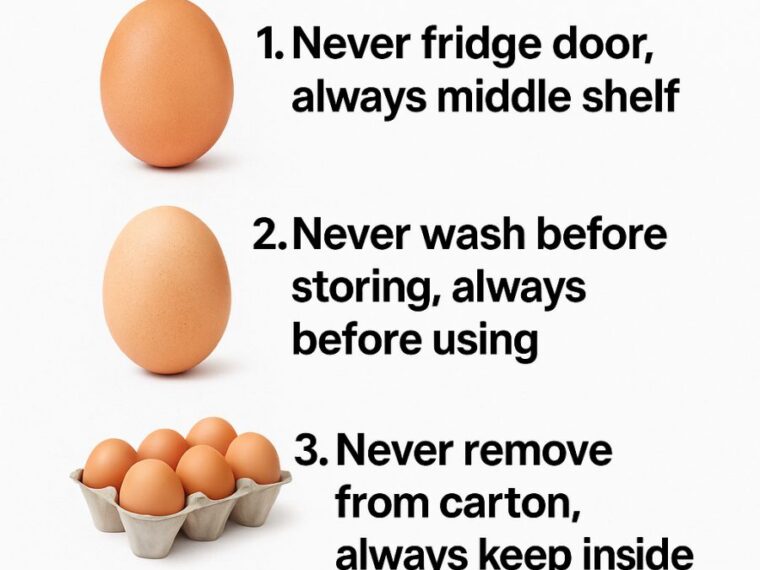Eggs are a staple in many households, praised for their versatility and nutritional value. However, despite their common presence in kitchens, the proper storage of eggs is often misunderstood, leading to diminished quality and potential health risks. Many people simply place their eggs in the fridge door or keep them on the counter, unaware of the potential consequences of these practices.
Understanding the correct methods for storing eggs can not only extend their shelf life but also ensure they remain safe for consumption. This article will guide you through the most effective ways to store eggs, addressing common misconceptions and providing practical tips to maintain their freshness and nutritional integrity.
1. Why Proper Egg Storage Matters
Proper egg storage is crucial for maintaining both the safety and quality of the eggs. When eggs are not stored correctly, they can become susceptible to bacteria such as Salmonella, which can lead to foodborne illnesses. The USDA recommends storing eggs at a temperature of 40°F (4°C) or lower to minimize bacterial growth.
Additionally, storing eggs properly helps maintain their freshness. Eggs are porous and can absorb odors and flavors from other foods, which can negatively impact their taste. By storing them correctly, you ensure that they remain fresh and flavorful for longer periods.
2. The Risks of Storing Eggs in the Fridge Door
Many refrigerators have egg holders in the door, but storing eggs here is not ideal. The fridge door is the warmest part of the refrigerator, experiencing temperature fluctuations every time the door is opened. These fluctuations can lead to a reduction in egg quality and increase the risk of bacterial growth.
Instead, it’s recommended to store eggs on a stable shelf in the main body of the fridge, where the temperature is more consistent. This helps maintain a constant, safe temperature for the eggs, ensuring they remain fresh and safe to eat.
3. The Benefits of Keeping Eggs on the Middle Shelf
The middle shelf of the refrigerator provides a stable and cool environment, ideal for storing eggs. This area tends to have a consistent temperature, typically around 37°F (3°C), which is optimal for preserving the quality of eggs.
By placing eggs on the middle shelf, you ensure they are stored in a location that minimizes exposure to temperature fluctuations. This consistent environment helps prevent the growth of bacteria and maintains the eggs’ freshness for a longer period.
4. The Importance of Keeping Eggs in Their Carton
Egg cartons are specifically designed to protect eggs from physical damage and contamination. They also help prevent the eggs from absorbing strong odors and flavors from other foods in the refrigerator.
Keeping eggs in their carton also allows you to easily check the expiration date, ensuring you consume them while they are still fresh. The carton also provides a barrier against light, which can degrade the quality of eggs over time.
5. Avoiding Odors: Why Eggs and Onions Don’t Mix
Eggs have porous shells that can absorb strong odors from nearby foods, such as onions. Storing eggs near potent-smelling foods can result in the eggs taking on these unwanted flavors, affecting their taste when cooked.
To prevent this, it’s best to store eggs in their carton and place them away from foods with strong odors. This helps preserve their natural flavor and ensures a more pleasant culinary experience.
6. The Myth of Washing Eggs Before Storage
Washing eggs before storing them can actually increase the risk of contamination. The egg’s natural bloom, a protective coating on the shell, helps keep bacteria out. Washing eggs can remove this protective layer, making them more susceptible to bacterial penetration.
It’s best to store eggs as they are and wash them just before use if necessary. This practice helps maintain their natural defenses and ensures they remain safe for consumption.
7. Understanding Egg Freshness and Expiration Dates
Egg cartons often come with expiration dates, but understanding how to assess egg freshness can be just as important. Fresh eggs will have a firm yolk and a thick egg white, while older eggs may have a runnier consistency.
To test an egg’s freshness, you can perform the float test: place an egg in a bowl of water. Fresh eggs will sink to the bottom, while older eggs will float due to the increased size of the air cell inside the shell.
8. The Science Behind Eggshell Porosity
Eggshells are covered in tiny pores, which allow air and moisture to pass through. This porosity is beneficial for the developing chick in fertilized eggs, but it also means that eggs can absorb odors and flavors from their environment.
Understanding the porous nature of eggshells highlights the importance of proper storage. Keeping eggs in their carton and away from strong-smelling foods helps maintain their natural flavor and freshness.
9. How Temperature Fluctuations Affect Egg Quality
Temperature fluctuations can have a significant impact on egg quality. When eggs are exposed to varying temperatures, they can develop condensation on the shell, which can facilitate the growth of bacteria.
Consistent refrigeration at a stable temperature helps mitigate this risk, ensuring that eggs remain safe to consume and maintain their quality over time.
10. Debunking Viral Egg Storage Hacks
The internet is rife with viral hacks and tips for storing eggs, but not all of these are based on science or best practices. One common myth is that storing eggs at room temperature is safe, which increases the risk of bacterial growth.
Another hack suggests coating eggs in oil to extend their shelf life. While this may work in some cases, it can also trap bacteria on the shell if not done properly. It’s best to stick with tried-and-true methods, such as refrigeration, to ensure egg safety and quality.
11. The Environmental Impact of Egg Storage Practices
Proper egg storage not only affects food safety and quality but also has environmental implications. Wasting food due to improper storage contributes to larger environmental issues, such as greenhouse gas emissions from decomposing waste.
By storing eggs correctly and maximizing their shelf life, you can help reduce food waste and minimize your environmental footprint. Making small changes in how you store your eggs can contribute to a more sustainable lifestyle.





